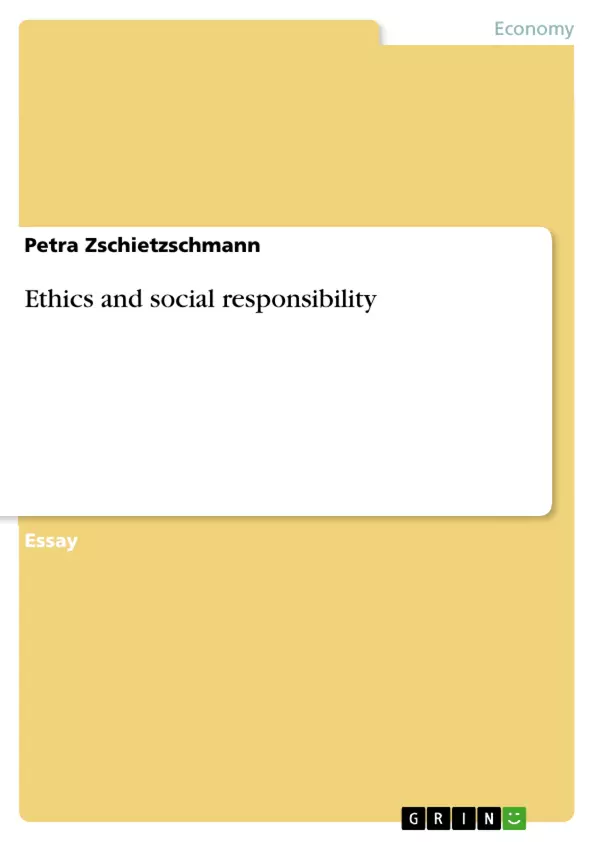Using your knowledge of ethics and social responsibility, critically analyse the following statement: “The obligation of organisations to make a profit is incompatible with a socially responsible approach to business. Consequently, profit-driven organisations are unethical.”“The reasons for the newly elevated place of ethics in business thinking are many. Managers have seen the high costs that corporate scandals have exacted: heavy fines, disruption of the normal routine, low employee morale, increased turnover, difficulty in recruiting, internal fraud, and loss of public confidence in the reputation of the firm” (Clark & Johnson 1995, p. 26). Therefore, why should an organisation intentionally act socially irresponsible or even unethically when managers seek to attain their goal of profit making as long as they are aware of these consequences? The purpose of this essay is to acknowledge a socially responsible approach to business. It aims to analyse the relationship between profit making on the one hand and both social responsibility and ethical behaviour on the other hand. It will also reveal that profit-driven organisations are not automatically unethical in nature.
Inhaltsverzeichnis (Table of Contents)
- Corporate social responsibility
- Social responsibility is to make profits
- Organisations are dependent on their various stakeholders who help them to attain their goal of making profit
- What is ethics and ethical behaviour?
Zielsetzung und Themenschwerpunkte (Objectives and Key Themes)
This essay examines the relationship between profit-making and both social responsibility and ethical behavior. It argues that profit-driven organizations are not inherently unethical, but that there is a complex interplay between these concepts. The essay explores the role of stakeholders in influencing corporate behavior and highlights the importance of ethical decision-making in a globalized market.
- The interplay between profit-making and social responsibility
- The role of stakeholders in influencing corporate behavior
- The importance of ethical decision-making in a globalized market
- The relationship between ethics and social responsibility
- The subjective nature of ethical standards and the challenges of navigating different cultures
Zusammenfassung der Kapitel (Chapter Summaries)
- The first chapter introduces the concept of corporate social responsibility and highlights the need for organizations to consider the interests of their stakeholders beyond just shareholders. It argues that managers must balance profit maximization with fulfilling the needs of employees, customers, suppliers, the government, and financial institutions.
- The second chapter delves into the relationship between social responsibility and profit-making. It presents Milton Friedman's argument that the primary responsibility of a business is to increase its profits, which in turn benefits all stakeholders. However, it also acknowledges that socially responsible practices can be a competitive advantage.
- The third chapter focuses on the role of stakeholders in influencing corporate behavior. It suggests that meeting the expectations of all stakeholders is key to maximizing profits. It emphasizes the need for organizations to consider the diverse interests of their stakeholders and to address any issues that may arise from their actions.
- The final chapter examines the concept of ethics and ethical behavior. It defines ethics as a code of moral principles that guides behavior and highlights the subjective nature of ethical standards. It emphasizes the importance of ethical decision-making in a globalized market and the challenges of navigating different cultural norms.
Schlüsselwörter (Keywords)
The essay focuses on the concepts of social responsibility, profit-making, stakeholder engagement, and ethical behavior in a global business context. It explores the complexities of navigating different cultural norms and the need for ethical decision-making.
Frequently Asked Questions
Is profit-making incompatible with corporate social responsibility (CSR)?
No, the essay argues that profit-driven organizations are not automatically unethical and that profitability can coexist with socially responsible business practices.
What is the role of stakeholders in an organization?
Organizations depend on various stakeholders—including employees, customers, and the government—who influence and help the business attain its profit goals.
What did Milton Friedman argue regarding social responsibility?
Friedman argued that the primary social responsibility of a business is to increase its profits, which ultimately benefits society through economic growth.
How do corporate scandals affect businesses?
Scandals lead to high costs such as heavy fines, low employee morale, increased turnover, and a loss of public confidence in the firm's reputation.
What is the definition of ethics in a business context?
Ethics is defined as a code of moral principles that guides behavior, though these standards can be subjective and vary across different cultures.
Why should managers act ethically?
Ethical behavior can provide a competitive advantage and is necessary to maintain long-term stakeholder trust and public reputation in a globalized market.
- Citar trabajo
- Petra Zschietzschmann (Autor), 2004, Ethics and social responsibility, Múnich, GRIN Verlag, https://www.grin.com/document/54129



